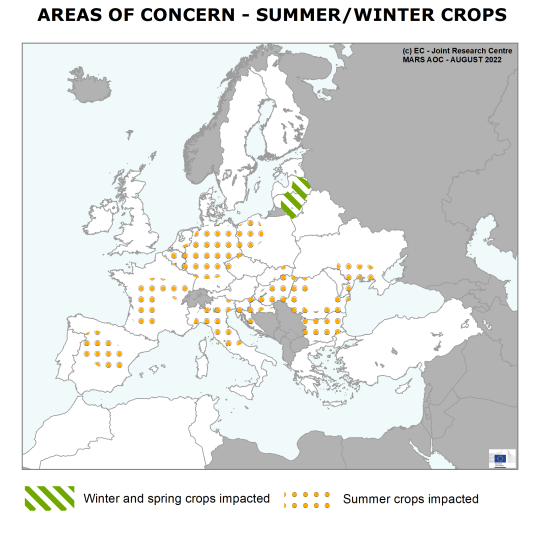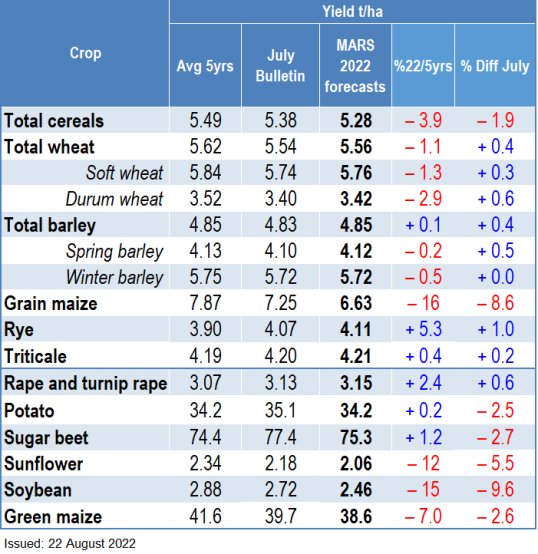Exceptionally hot and dry weather conditions in much of Europe continued to substantially reduce yield outlooks for the EU’s summer crops.
Yield outlook for summer crops further reduced
According to the August issue of the JRC MARS Bulletin – Crop monitoring in Europe, published today, the exceptionally hot and dry weather conditions in much of Europe continued to substantially reduce yield outlooks for the EU’s summer crops. The crops most markedly affected are grain maize (-8.6% at EU level), sunflowers (-5.5%) and soybeans (-9.6%). Current yield forecasts for these crops are between 12% (sunflowers) and 16% (grain maize) below the 5-year average.
Conversely, the hot and dry conditions benefited the harvesting of winter crops, which saw a slight improvement in yield forecasts.

Extremely dry and hot conditions throughout most of Europe
Spain, France, central and northern Italy, central Germany, Hungary, Romania, Slovenia and Croatia are among the most severely affected regions in Europe. These regions had already been affected by long-term rain deficits. Periods of water and heat stress partly coincided with the sensitive flowering and grain-filling stages. This combination resulted in irreversibly lost yield potential. Several countries have imposed measures to restrict water use for irrigation. In some regions (e.g. north-western Italy, southern and central Spain), the very low water levels in reservoirs have been insufficient to meet the water needs of crops, and irrigation of some fields has been abandoned.
In the Benelux countries, western Germany, western Poland, eastern Slovakia, Bulgaria and southern Ukraine, the scarcity of rainfall combined with occasional peaks in temperature also stressed summer crops, with negative effects on the yield outlook.
Rainfall surplus in Latvia and Lithuania negatively affects winter crops
While the lack of precipitation favoured the harvesting of winter crops in most countries, a distinct rainfall surplus in Latvia and Lithuania negatively affected winter crops during the last stages of grain filling and ripening, and may have caused some delay to the start of the harvest.

We need your help: JRC MARS Bulletins Survey
The JRC MARS Bulletins Survey aims to collect information to better understand how you use the JRC MARS Bulletin. This will help us to improve our service in the future. Completion of the survey should take less than 10 minutes of your time. All information collected will be anonymous – no personal information is requested.
The survey is available at 2022 JRC MARS Bulletin – Crop Monitoring in Europe Survey
Further information
JRC MARS (Monitoring Agricultural Resources) Bulletins
The latest information about global agricultural production hotspots for countries at risk of food insecurity is available on the JRC’s ASAP (Anomaly hot Spots of Agricultural Production) site.
